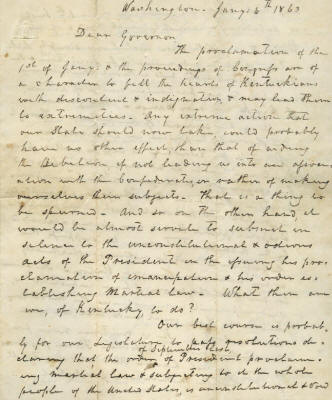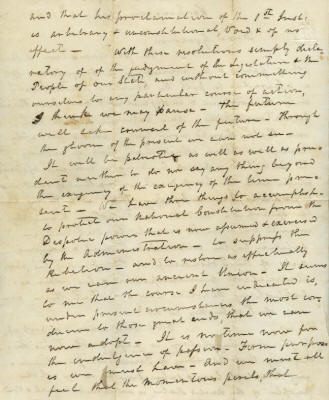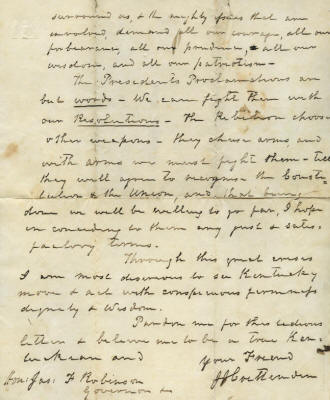902605
John J. Crittenden
Click on images for larger size
Crittenden decries President Lincoln's "unconstitutional & odious acts . . .
in the issuing of his proclamation of emancipation & his order establishing Martial Law”
John Jordan Crittenden, 1786-1863. American statesman from Kentucky. Superb content Autograph Letter Signed, J J Crittenden, three pages, with integral leaf, 8" x 9¾", Washington, [D.C.], January 6, 1863.
This is an outstanding and politically significant letter in which Crittenden, then a Congressman from Kentucky, wrestles with an appropriate response to President Abraham Lincoln’s Emancipation Proclamation in the wake of the second proclamation, issued January 1, 1863, freeing slaves in the states in rebellion against the United States government—which did not include Kentucky, a border slave state that did not secede.
A former United States Senator and Attorney General, Crittenden seeks to balance the interests of constituents in Kentucky against his own desire to remain loyal to the Union and suppress the Confederate rebellion. Crittenden, a strong unionist, decries the Confederacy but intones the stark language of nullification in his diatribe against the proclamation itself and against Lincoln’s declaration of martial law.
Writing to Kentucky Governor James F. Robinson, a unionist Democrat, Crittenden strikes the politically sensitive balance by suggesting strong words but no action. He says, in full:
Dear Governor,
The proclamation of the 1st of Jany: & the proceedings of Congress are of a character to fill the hearts of Kentuckians with discontent & indignation, & may lead them to extremities. Any extreme action that our State should now take, could probably have no other effect, than that of aiding the Rebellion, if not leading us into an asseveration with the Confederates, or rather of making ourselves their subjects. That is a thing to be spurned. And so on the other hand, it would be almost servile to submit in silence to the unconstitutional & odious acts of the President in the issuing of his proclamation of emancipation & his order establishing Martial Law. What then are we, of Kentucky, to do?
Our best course is probably for our Legislature to pass resolutions declaring that the order of September last, of President proclaiming martial law & subjecting to it the whole people of the United States, is unconstitutional & void and that his proclamation of the 1st Inst. is arbitrary & unconstitutional, void & of no effect.
With these resolutions simply declaratory of of [sic] the judgment of the Legislature & the People of our State, and without committing ourselves to any particular course of action, I think we may pause. The future will take counsel of the future. Through this gloom of the present we can not see. It will be patriotic as well as well [sic] as prudent neither to do nor say any thing beyond the exigency of the exigency [sic] of the time present. We have three things to accomplish—to protect our National Constitution from the Despotic power that is now assumed & exercised by the Administration—to suppress the Rebellion—and to restore as effectually as we can our ancient Union. It seems to me that the course I have indicated is, under present circumstances, the most conducive to those great ends, that we can now adopt. It is no time now for the indulgence of passion. Firm purposes we must have. And we must all feel that the momentous perils, that surround us, & the mighty issues that are involved, demand all our courage, all our forbearance, all our prudence, all our wisdom, and all our patriotism.
The President's Proclamations are but words. We can fight them with our Resolutions. The Rebelion [sic] chooses other weapons—they choose arms, and with arms we might fight them—till they will agree to recognize the Constitution & the Union, and that being done we will be willing to go far, I hope in conceding to them any just & satisfactory terms.
Through this great crisis I am most desirious [sic] to see Kentucky move & act with conspicuous firmness dignity & wisdom.
Parson me for this tedious letter & believe me to be a true Kentuckian and
Your Friend
J J Crittenden
Kentucky’s population was split between pro-Union and pro-Confederate factions, and its men joined both the Union and Confederate armies. Pro-Confederate Kentuckians organized a secessionist government that theoretically joined the Confederacy in late 1861, and thus Kentucky had representatives in both the Union and Confederate Congresses, but realistically the presence of Union forces kept Kentucky solidly in Union control after General Ulysses S. Grant moved through southern Kentucky in early 1862.
Hence the politically sensitive, and potentially explosive, situation that Crittenden addressed in this letter to Robinson, who succeeded Magoffin. Facially, Kentucky was unaffected by Lincoln’s final Emancipation Proclamation on January 1, 1863, which purported to free the slaves in states other than Kentucky. Yet on September 24, 1862, Lincoln had also declared martial law, which directly affected pro-Confederate Kentuckians by subjecting "all rebels and insurgents, their aiders and abettors, within the United States, and all persons discouraging volunteer enlistments, resisting militia draft or guilty of any disloyal practice affording aid and comfort to rebels against the authority of the United States" to "trial and punishment by courts-martial or military commissions." Lincoln also suspended the writ of habeas corpus as to persons under military imprisonment or confinement. Thus Crittenden specifically mentioned Lincoln's proclamation "proclaiming martial law & subjecting to it the whole people of the United States."
Crittenden has penned this letter in black. The letter has fold splits on both leaves, leaving it in fair to good condition overall. The exceptional content, however, overcomes the physical defects.
Unframed.
_____________
This item has been sold, but
click here to see other
American History items
that we are offering.






